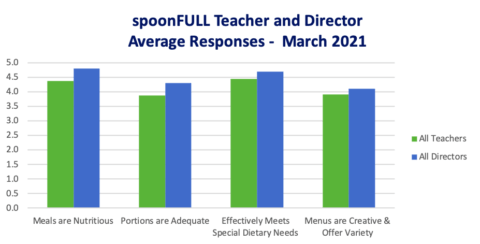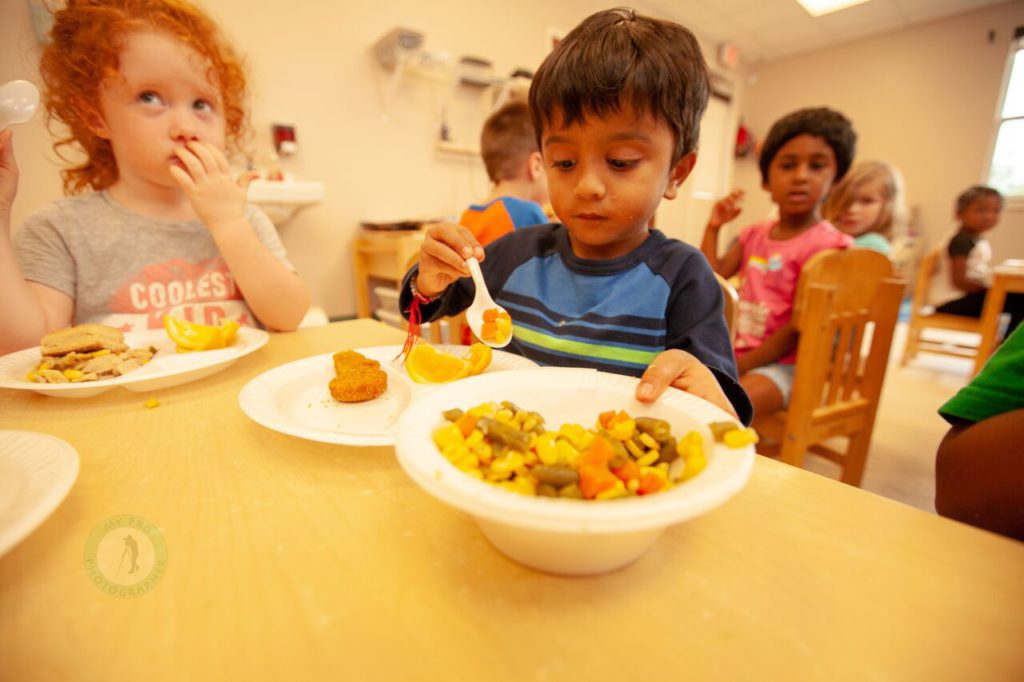“We are so grateful that this program exists. Many of our children would not eat any fruits or vegetables if it were not for the fact that you all offer them each day in the meals that you serve.”
— Director of a participating spoonFULL center in Durham, N.C.

Recently, Child Care Services Association (CCSA) surveyed the local early childhood centers in the Triangle that participate in spoonFULL (Fresh, Unique, Liked and Local), CCSA’s meal services program. We had a good number of responses from both directors and teachers.
Overwhelmingly, the results show CCSA provides a service that meets centers’ needs, one they can rely on every day. This has been critical during the past year where everything changed regularly. Despite many centers closing temporarily and some permanently, and many closing periodically over the past year, all three of CCSA’s kitchens stayed open every workday, never missing a meal service. This ability to stay open is due in large measure to the dedication of the spoonFULL kitchen staff who won high praises from survey respondents.
“Great program, we appreciate the hard work and great meals!”
“Lisa and her staff have been very helpful. We have been open for almost two years and I’m trying to figure it all out. They have been patient and have worked with me many times.”
Centers are pleased with spoonFULL, and they value the opportunity to have so many fresh fruits and vegetables on the menus and a local meal vendor who supports their children’s needs.
“I like the fresh local produce, and it does offer healthy meals and food options to children that may not be introduced to those foods (beets, cauliflower, turnip greens, etc.).”
“We like having more local food and having it highlighted on the menu.”
spoonFULL scores high marks on the mechanics of the meal service, including delivery (on-time, appropriately hot/cold, and received damage free) and our response to the centers’ needs early in the COVID-19 pandemic. At that time, spoonFULL pivoted to meals served in individual containers. This allowed teachers to give children their food without using shared utensils and limited the number of times the food was touched. This was critical when there was little understanding of COVID-19 transmission.
Meeting Dietary Needs

Another notable strength of the program is spoonFULL’s ability to effectively meet children’s special dietary needs (allergies, food intolerances and requested modifications). spoonFULL serves alternative menu choices to children with special dietary needs as identified by the family and its health provider. In fact, the number of meal modifications in a kitchen can run into the high double digits some days, once all meals and components are completed.
Modifications can be as simple as substituting one fruit for another or as complex as making an alternate macaroni and cheese dish by swapping regular pasta for gluten-free pasta, using dairy-free cheese and replacing the flour in the sauce with cornstarch. The kitchens often prepare a dish that meets the needs of more than one diet to give everyone something similar to the regular menu. Of course, this adds significant complexity to daily food preparation.
The surveys also give CCSA the chance to identify areas where spoonFULL can continue to grow. Feedback indicates that some meals are not as appealing to young children as others. For example, each week, spoonFULL serves two vegetarian entrées that may not be familiar to children. However, spoonFULL meets all USDA nutritional standards with menus including whole grains, a variety of fruits and vegetables and a range of cuisines. Some of these foods may be new to young eaters.
Introducing Children to New Foods

It is well documented that young children need repeated exposure to a new food (8-10 tries is typical) before they accept it as something they like to eat.[1] This gives teachers learning opportunities to talk with young children about new foods and to encourage tasting everything. One of the ways we help is by providing the monthly Harvest of the Month newsletter to each center. Teachers can incorporate its information into their lesson plans and teach about locally grown food. Centers can also send the newsletter home, which gives families information about the food their children eat.
Our kitchen teams are reviewing menus and finding additional kid-friendly recipes. We will introduce new menus slowly, to give children a chance to become familiar with the new tastes. Serving food to young children is a balancing act—trying new flavors and combinations to meet their growing dietary needs while at the same time serving other food that is familiar to them.
In addition to searching for new recipes, we have a variety of suggestions for menu items from survey participants. Some of these ideas are tweaks to existing menu items while others are new options to explore. spoonFULL staff are glad to have received such rich feedback and will consider every suggestion. For a copy of this month’s menus, visit spoonFULL on CCSA’s website.
Why is CCSA’s spoonFULL Program Committed to Serving Wholesome Food to Young Children?
Childhood obesity is an alarming problem in the United States that can lead to a host of medical issues.[2] For example, a recent study found that an unhealthy diet is associated with poorer sleep quality in young children. “Encouraging healthier dietary choices and educating caregivers on ways to reinforce such habits may be means to improve child sleep quality,” said the researchers.[3] As such, spoonFULL aims to support young children’s health and life outcomes by providing healthy food choices and encouraging a life-long interest in eating nutritious food.
If your early childhood program is located in the Triangle area of North Carolina and you are interested in learning more about CCSA’s meal services, please contact spoonFULL.
[1] 5210 Healthy Children, Getting Children to Try New Foods, Clearinghouse for Military Family Readiness at Penn State.
[2] Childhood Obesity Causes & Consequences, Centers for Disease Control and Prevention.
[3] Holmes, J., St. Laurent, C., and Spencer, R. (2021). Unhealthy Diet is Associated with Poor Sleep in Preschool-Aged Children, The Journal of Genetic Psychology.



